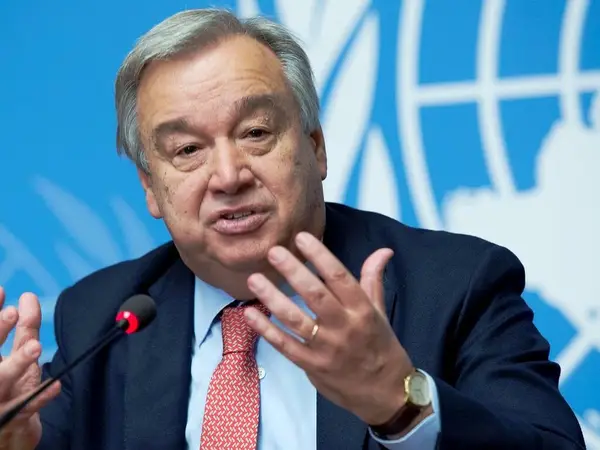In its latest report on the situation of human rights in Iran, the United Nations has expressed concern over excessive force against dissidents and protests.
UN Secretary General António Guterres submitted an interim report on Iran’s rights situation on June 16 -- covering the period from June 11, 2021 to March 20 2022 -- to be presented to the Human Rights Council at its 50th regular session (13 June – 8 July 2022).
The report received testimonies and reports by non-governmental organizations, individuals, victims and their families “concerning potential violations of the right to life allegedly by the State, including arbitrary executions, use of deadly force by security forces against peaceful protesters and border couriers, as well as arbitrary deprivation of life in detention as a result of torture or denial of timely access to medical care.”
The Office of the United Nations High Commissioner for Human Rights continued to receive reports of torture and ill-treatment in places of detention, resulting in death, the UN chief said, mentioning the names of numerous people who died in custody such as Shahin Naseri, Amirhossein Hatami, Adel Kianpour and Baktash Abtin.
Decrying “the high number of death penalty sentences and executions” and “reports of death in prison due to denial of adequate and timely medical care,” the UN chief said that the number of executions in the Iran increased from at least 260 cases in 2020 to 310 individuals in 2021, and the number of continued to rise into 2022.
According to the report, between 1 January 2022 and 20 March 2022, at least 105 people were executed, and in March 2022, 52 prisoners convicted and sentenced to death on drug-related charges were transferred for execution to Shiraz Central Prison. By mid-March, at least 16 of them had been executed.
It also condemned Iran’s “execution of child offenders,” saying, “Under international human rights instruments, to which the Islamic Republic of Iran is a party, capital punishment shall not be imposed for offenses committed by persons below 18 years of age.”
Referring to protests that broke out in over 26 cities in Khuzestan Province over water shortages in July 2021, the UN chief also criticized “enforced disappearances of protesters” and said that “on some occasions, the authorities reportedly used plainclothes agents to pose as armed or violent protesters, and subsequently blamed the deaths of protesters on them”
Guterres also expressed concern about the potential impacts of Iran’s policies aimed at increasing population growth, such as the Youthful Population and Protection of the Family law, which restricts sale of contraceptives, bans sterilization and restricts abortion, "on men, women and girls’ rights to sexual and reproductive health.”
The UN also voiced concern at “further legislative measures aimed at restricting the digital space,” including the User Protection Bill which “would grant the government and army extensive control over infrastructure that connects Iran to the global internet.”
The report also denounced the manner in which the Islamic Republic is using Article 49 of the Constitution to “confiscate wealth and property of minorities, particularly the Baha’i religious minority, as well as of political dissidents and their families.”
Guterres also noted that “journalists, including journalists abroad working for foreign media outlets, continued to be intimidated. Such acts included coercion by proxy through threats against family members inside the country, economic pressure, travel bans and interrogations.”
He also slammed the intensifying summoning, arrest and detention of labor rights defenders amidst growing protests by teachers, retirees and other groups demanding labor and social security rights.
Low growth, high inflation and widespread unemployment have caused widening economic disparities, the report added.
Guterres concluded his report with a list of recommendations to improve the human rights situation in the country, including abolishing the death penalty, reforms to strengthen the right to fair trial in line with international standards, releasing all persons detained arbitrarily immediately, investigations into the use of excessive and lethal force during protests and steps to eliminate all forms of discrimination against women and girls.
In March, Iran's foreign ministry accused the UN Human Rights rapporteur of 'politicizing' the situation of human rights in Iran and issuing biased reports, in reference to the report by UN special rapporteur Javaid Rehman.
